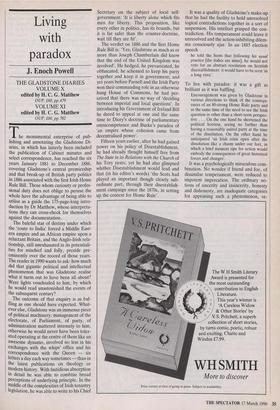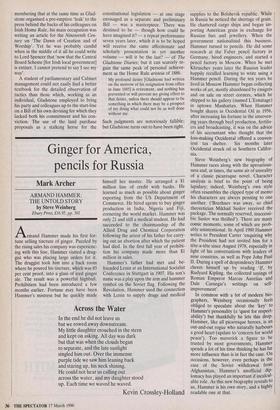Living with paradox
J. Enoch Powell
THE GLADSTONE DIARIES VOLUME X edited by H. C. G. Matthew
OUP, f60, pp.479
VOLUME XI edited by H. C. G. Matthew
OUP, £60, pp.702
The monumental enterprise of pub- lishing and annotating the Gladstone Di- aries, in which has latterly been included the publication of Cabinet minutes and select correspondence, has reached the six years January 1881 to December 1886, covering Gladstone's central premiership and that break-up of British party politics in 1886 associated with the first Irish Home Rule Bill. Those whom curiosity or profes- sional duty does not oblige to peruse the whole have the advantage of being able to utilise as a guide the 175-page-long intro- duction by Dr Matthew, whose interpreta- tions they can cross-check for themselves against the documentation.
The baleful star of destiny under which the 'route to India' forced a Middle East- ern empire and an African empire upon a reluctant Britain, and the Anglo-Irish rela- tionship, still unexhausted in its potentiali- ties for mischief and folly, preside pre- eminently over the record of those years. The reader in 1990 wants to ask: how much did that gigantic political and intellectual phenomenon that was Gladstone realise what it turns out to have been all about? Were lights vouchsafed to him, by which he would read unastonished the events of the subsequent century? The outcome of that enquiry is as baf- fling as one should have expected. What- ever else, Gladstone was an immense piece of political machinery: management of the electorate, of Parliament, of party, of administration mattered intensely to him; otherwise he would never have been toler- ated operating at the centre of them like an awesome dynamo, involved no less in his exchanges with the whips' office and his correspondence with the Queen — six letters a day each way sometimes — than in the latest publications on theology or modern history. With fastidious absorption in detail he was able to combine broad perceptions of underlying principle. In the middle of the complexities of Irish tenantry legislation, he was able to write to his Chief Secretary on the subject of local self- government: 'It is liberty alone which fits men for liberty. This proposition, like every other in politics, has its bounds, but it is far safer than the counter-doctrine, wait till they are fit'.
The verdict on 1886 and the first Home Rule Bill is: 'Yes; Gladstone as much as or more than Joseph Chamberlain did know that the end of the United Kingdom was involved'. He hedged, he prevaricated, he obfuscated, he schemed to keep his party together and keep it in government; and yet years before Parnell and the Irish Party won their commanding role in an otherwise hung House of Commons, he had per- ceived that there was no way of 'deciding between imperial and local questions'. In introducing his Government of Ireland Bill he dared to appeal at one and the same time to Dicey's doctrine of parliamentary omnicompetence and Burke's paradox of 'an empire whose cohesion came from decentralised power'.
Fifteen years earlier, after he had gained power on his policy of Disestablishment, he had already thought himself free from The State in its Relations with the Church of his Tory years; yet he had also glimpsed whither Disestablishment would lead and that (in his editor's words) 'the Scots had played an important though clearly sub- ordinate part, through their disestablish- ment campaign since the 1870s, in setting up the context for Home Rule'. It was a quality of Gladstone's make-up that he had the facility to hold unresolved logical contradictions together in a sort of suspension. His intellect grasped the con- tradiction. His temperament could leave it unresolved and the action-inhibiting dilem- ma consciously ajar. In an 1885 election speech
he told the Scots that following his usual practice [the italics are mine], he would not vote for an abstract resolution on Scottish disestablishment: it would have to be seen 'in a long vista'.
To live with paradox: it was a gift as brilliant as it was baffling.
Encouragement was given by Gladstone in various directions to think of the consequ- ences of an 80-strong Home Rule party and at the same time of the need to see the Irish question in other than a short-term perspec- tive • . . On the one hand he shortened the political horizon, seeing no further than having a reasonably united party at the time of the dissolution. On the other hand he anticipated 'an Irish crisis open after the dissolution like a chasm under our feet, in which a brief moment ripe for action would embody the consequences of great historical forces and changes'.
It was a psychologically miraculous com- bination. No wonder if friend and foe, of dissimilar temperament, were reduced to impotent imprecation. The ordinary no- tions of sincerity and insincerity, honesty and dishonesty, are inadequate categories for appraising such a phenomenon, re- membering that at the same time as Glad- stone organised a pre-emptive 'leak' to the press behind the backs of his colleagues on Irish Home Rule, his main occupation was writing an article for the Nineteenth Cen- tury on 'The Dawn of Creation and of Worship'. Yet he was probably candid when in the middle of it all he could write to Lord Spencer that 'now that the Central Board Scheme [for Irish local government] is extinct, I cannot pretend to say I see my way'.
A student of parliamentary and Cabinet management could not easily find a better textbook for the detailed observation of tactics than those which, working as an individual, Gladstone employed to bring his party and colleagues up to the start-line on a Bill of his own devising for which they lacked both his commitment and his con- viction. The use of the land purchase proposals as a stalking horse for the constitutional legislation — at one stage envisaged as a separate and preliminary Bill — was a masterpiece. There was destined to be — though how could he have imagined it? — a repeat performance seven years later, which it is to be hoped will receive the same affectionate and scholarly presentation in yet another volume — will it be the last? — of The Gladstone Diaries; but it can scarcely re- gain the same peak of personal achieve- ment as the Home Rule aristeia of 1886.
My profound desire [Gladstone had written
on the morrow of his resignation from office in June 1885] is retirement, and nothing has
prevented or will prevent my giving effect to
that desire, unless there should appear to be
something in which there may be a prospect
of my doing what could not be as well done without me.
Such judgments are notoriously fallible; but Gladstone turns out to have been right.



























































 Previous page
Previous page